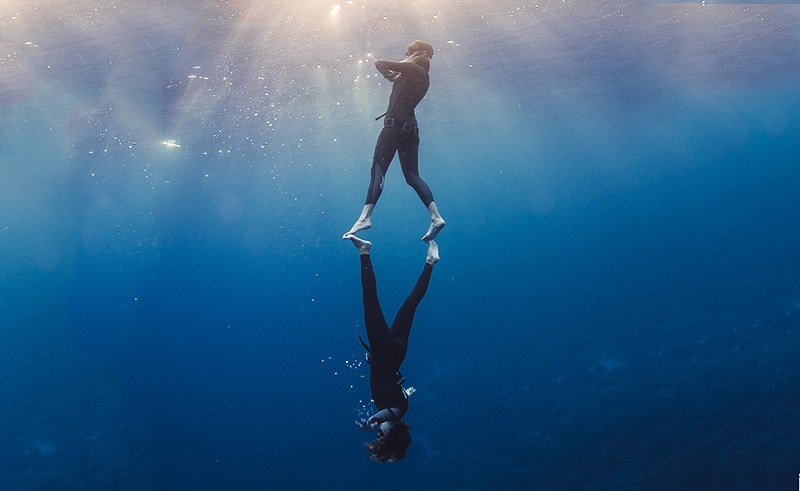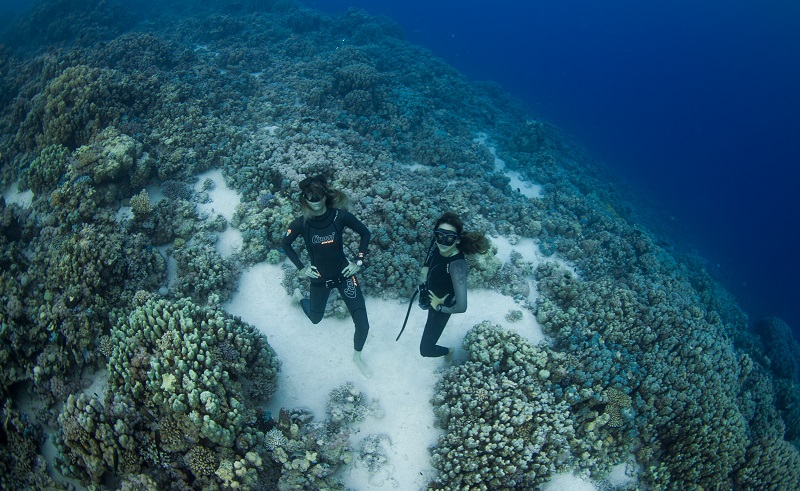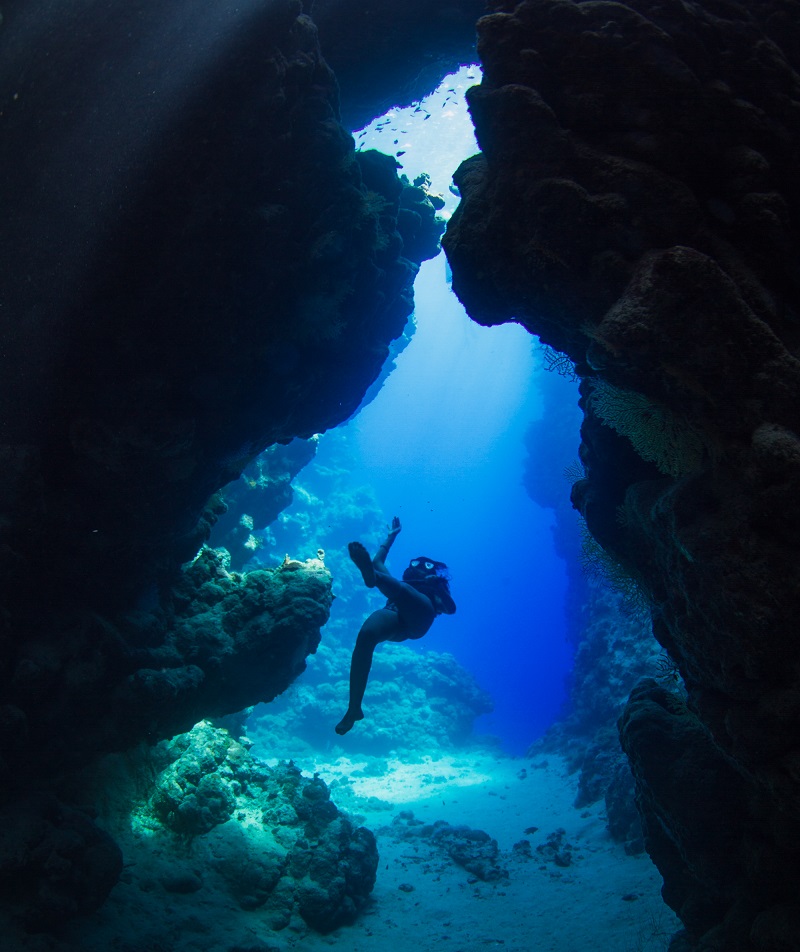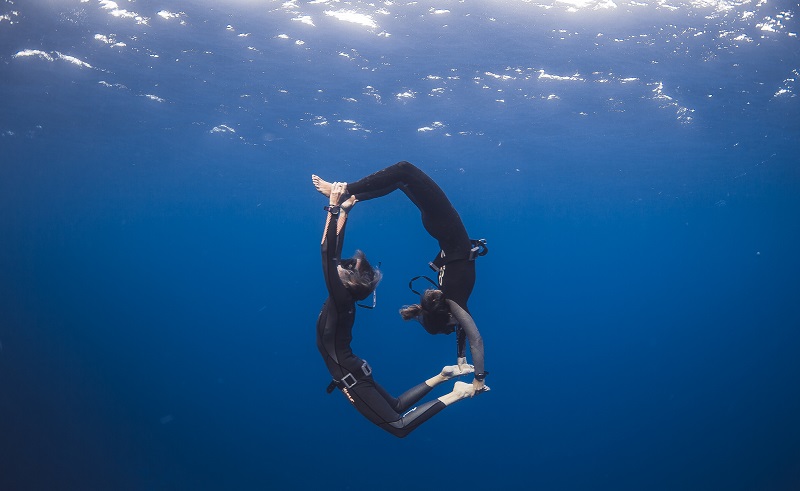Meet the Female Freediver Breaking National Records in Egypt
Egypt is lucky to have the world's best freediving spots, yet most Egyptians are unaware of this spectacular sport! Egypt's four times national freediving champion, Raghda Ezzeldin Aly, is hoping to change this.

Gliding through a shimmering blue landscape where only your heartbeat is music; drifting past bright corals in every colour and over little-explored shipwrecks teaming with fish of all shapes and sizes – to a freediver, this silent, serene universe is the world’s best kept secret and the epitome of freedom.
Despite Egypt having some of the world’s most spectacular dive sites on its doorstep, few Egyptians know much about freediving; fewer still actually practice the sport. Unlike scuba diving, freediving needs no equipment and so divers have to hold their breath until they resurface. Dahab is the world’s premier freediving destination, attracting the best freedivers from across the globe three times a year to compete in the RedCCup.
Raghda Ezzeldin Aly is the four time national freediving record-breaker and founder of Egypt Free Divers, which provides divers with connections to dive centres, suppliers, and instructors, organises training camps for certified divers, and fun trips for those looking to try the sport. A financial analyst by profession, she is passionate about raising awareness about freediving and for this reason, all trips are organised without profit in mind. 
Ezzeldin has always loved the sea, and had been scuba diving for some time when she discovered freediving. "You have more freedom as a freediver," she tells us. ‘For me, something felt off when scuba diving as I found the gear constraining." Describing her most memorable dive experience in Hurghada, she narrates how, without needing equipment, she just jumped off the boat in pursuit of a whale shark. "My friend dove in with his GoPro and I could just jump in too. We swam within inches of the shark – we have 35 minutes of footage!"
For me, something felt off when scuba diving - I found the gear constraining. You have more freedom as a freediver.
She explains how, in the same dive, they ran into a large group of dolphins. "Mammals freedive – dolphins need to come up for air every twenty minutes or so – so you are behaving as they do. Because dolphins echolocate, they can feel your heartbeat, but they also know that you are not breathing. This was very curious for them, and meant that they loved interacting with us – something that just doesn’t really happen with scuba diving as the gear creates distance and can be off-putting."
 (Photo credit: Taimour Othman)
(Photo credit: Taimour Othman)
Stories like these really show what a beautiful experience freediving can be, but holding your breath for so long may seem intimidating - or downright impossible - to those who haven’t tried the sport. Ezzeldin assures us, however, that learning to freedive is wonderfully beneficial, and even relaxing. "Freediving is a fantastic way to keep fit," she tells us. "In fact, you gain a huge amount of muscle without really realising. But I’d say it is 70% a mental sport."
Because dolphins echolocate, they can feel your heartbeat, but they also know that you are not breathing. This was very curious for them, and meant that they loved interacting with us – something that just doesn’t really happen with scuba diving as the gear creates distance and can be off-putting
Like yoga, freediving focuses on relaxation, breath, and body awareness. Divers start off learning to relax while floating so that they can hold their breath for longer, and as they gain confidence under water, the depth to which they go is gradually increased. Ezzeldin stresses that the sport requires no age, shape, or athletic background, only a desire to explore your physical and mental potential. "After two sessions, beginners are often surprised to find that they can hold their breath for two minutes and are diving up to 10 meters in depth!" Amazingly, Ezzeldin has only been freediving for a year, yet her static breath-hold time is a whopping 5 minutes 3 seconds. "If you fall in love with it, you can progress very quickly, not just in terms of depth or time, but in relaxation and enjoyment."
After two sessions, beginners are often surprised to find that they can hold their breath for two minutes and are diving up to 10 meters in depth
For those with more nervous dispositions, it’s also good to know that many of the risks associated with scuba diving are either absent or significantly reduced. As freedivers don’t breathe from a tank, decompression sickness can’t occur if they surface quickly – definitely a good thing if you suspect you can’t hold your breath much longer. And as freedivers will not be at great depth for long, oxygen narcosis is rare.  (Photo credit: Taimour Othman)
(Photo credit: Taimour Othman)
Moving forward, Ezzeldin hopes to compete for the African continental record, which will require her to dive 15 meters deeper. Though she recognises that there can be some conflict between competition and the ego-dissolution that freediving promotes, she hails such events as fantastic opportunities to meet other interesting, like-minded people. Speaking to her, it's her passion for the sport that shines, and it's clear that nothing would make her happier than encouraging others to discover the beauty of freediving. "We limit ourselves," she concludes, " And I want to encourage people to explore their bodies and their minds to really see what we can do. The mind is limitless!"
Check out Egypt Free Divers' Facebook page and Ezzeldin's Facebook and Instagram for more information!
Three day trips for beginners are in the region of EGP 1500-2000.
Trending This Week
-
Apr 18, 2025























